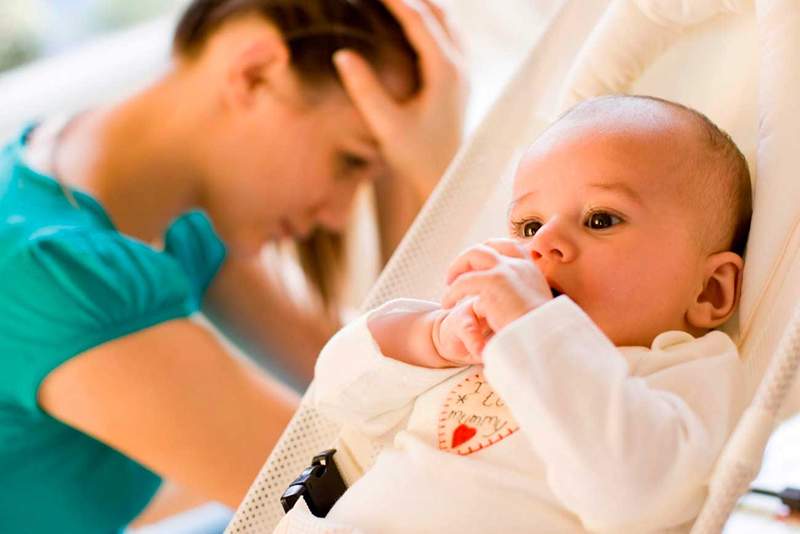Postpartum psychosis, what is and why?

- 1151
- 19
- Perry Hirthe
Postpartum psychosis is a uncommon psychological disorder that can come to be given in mothers who have just given birth. This problem, usually occurs in the days and/or weeks after childbirth and can be aggravated, so the mothers who present these symptoms usually need to be treated by health professionals urgently.
Content
Toggle- What is postpartum psychosis?
- Causes of postpartum psychosis
- Postpartum psychosis symptoms
- Other common symptoms in this type of disorders are:
- Postpartum psychosis treatment
- Links of interest
What is postpartum psychosis?
Postpartum psychosis is a severe mental disorder that occurs when a woman gives birth and as in all psychotic disorders, there is a loss of contact with reality which can become serious, translating into symptoms such as delusions or hallucinations. Although these symptoms can be alarming and both the patient and her relatives may feel great concern, with adequate treatment and medical supervision, mothers who present this disorder usually recover completely within a certain period of time from between six months to one year.
Causes of postpartum psychosis
This disorder is not very common, since it occurs between 0.1% and 0.2% of the population and usually affects women who have previously presented a history of certain psychological diseases such as bipolar or schizophrenia disorder, however it can also occur without a connection with other previous disorders.
Although the causes of postpartum psychosis are not entirely clear, the possibility of being enhanced by the great hormonal change that mothers may suffer after childbirth is considered.
Unlike postpartum depression that usually occurs from the third month after giving birth, postpartum psychosis appears very early, between the first and fourth week after giving birth, normally coming to give Between two to three days after delivery and even during the last weeks of pregnancy.
 Biodecoding, a controversial look at the origin of diseases
Biodecoding, a controversial look at the origin of diseases Postpartum psychosis symptoms
The symptoms of postpartum psychosis are very diverse and as in all psychotic disorders, there is a loss of contact with the serious reality that translates into different symptoms. Women suffering from this disorder usually present great excitement or symptoms of anxiety, depression or confusion. They can also present drastic changes and irritability. These above changes include the following symptoms:
- Strange and irrational ideas that can translate into delusions
- Present auditory hallucinations, visual or related to any sensory capacity. For example, the person can begin to hear voices that do not exist in real life
- Mood too high with loss of contact with reality, maniac episode.
Other common symptoms in this type of disorders are:
- Socialize and speak more than usual, with some verbiage
- Show accelerated thoughts and keep your mind excessively busy with these thoughts.
- Inability to feel union with the baby or respond to their needs
- Sleeping problems, even feeling that there is no need to sleep
- Out -of -control behavior
- Suicide thoughts and beliefs that the baby would be better without his mother
Some examples of more common delusional ideas may be to believe that things are connected and that any information can carry a personal message, or that the baby is connected to God or the demon in some way. You can also think about damaging the baby or herself.
Postpartum psychosis treatment
The treatment of this disorder is very important for the well -being, both of the mother and the baby and her relatives. Despite how serious it may result, With good medical attention the problem usually disappears until stability is found.
Sometimes, although the mother may notice that she is suffering a problem, she may not be fully aware of what is happening to her and not seek help properly. This can also happen for fear of taking the baby's custody, so they can not communicate the symptoms they are suffering. It is common for close spouses or relatives. It is necessary that this help be presented as soon as possible to alleviate any negative effect of this disorder.
In these cases, the mother is usually hospitalized for a few days and is usually common to prescribe antipsychotic and antidepressant medications to treat mood.
Links of interest
- What is psychosis?. https: // www.psychoactive.com/blog/Que-Is-Psychosis/
- First signs of psychosis How to detect them? https: // www.psychoactive.com/Blog/First-Signs-Psychosis-Detect them/
- What Is Postpartum Psychosis?. Madeline r. Vann, mph. https: // www.Everydayhealth.com/postpartum-psychasis/guide/
- What Is Postpartum Psychosis?. https: // www.App -network.Org/What-Is-PP/

